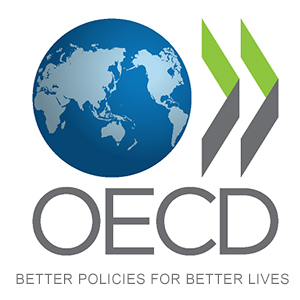The Organisation for Economic Co-operation and Development (OECD) is an international organisation comprised of 38 member countries that works to build better policies for better lives. Our mission is to promote policies that will improve the economic and social well-being of people around the world. Together with governments, policy makers and citizens, we work on establishing evidence-based international standards, and finding solutions to a range of social, economic and environmental challenges. From improving economic performance and creating jobs to fostering strong education and fighting international tax evasion, we provide a unique forum and knowledge hub for data and analysis, exchange of experiences, best-practice sharing, and advice on public policies and international standard-setting.
The Global Relations Secretariat (GRS) supports the implementation of the Secretary General’s strategic orientations by co-ordinating the Organisation’s relations with partner countries and with other international organisations. It advises the Office of the Secretary-General and other OECD Directorates on how to strengthen co-operation with key partner countries, regions and organisations. GRS also serves the OECD External Relations Committee (ERC), working with members to help them reach consensus on global relations priorities and ensuring that relevant partners are effectively engaged in the Organisation’s work.
GRS is looking for an experienced Statistician who would be based in Istanbul, Turkey and who would be responsible for a specific set of activities amongst those outlined below. The person would work under the supervision of the Head of the Centre.
Main responsibilities
Data collection and dataset management
- Gather data from OECD non-member countries in the statistical areas relevant to the programme of work of the Centre, to complement and complete existing OECD databases as needed.
- Convert national data collected from countries into specific OECD formats. Tasks in this process include data manipulation and various other analytical calculations.
- Verify the quality, namely the relevance, accuracy, accessibility, interpretability and coherence of the data and metadata.
- Manage statistical databases covering the statistical areas of interest for the Centre.
- Ensure and maintain the international comparability of data including properly managing methodological changes (e.g. the introduction of new international definitions).
- Research new data and data sources to expand the databases coverage.
- Contribute to further improving and increasing the efficiency of the collection and processing of data, to ensure regular and timely collection and transmission of data
- Build and maintain contacts with statistical staff in national and international statistics agencies to improve data coverage, timeliness, relevance and availability of the (meta) data.
- Keep abreast of the work of other international and national organisations (e.g. UN, Eurostat, the World Bank, etc.) on topics relevant to the statistician’s work.
Analysis, methodology, drafting and documentation
- Carry out data analysis with the objective of reporting on the main findings.
- Participate in the drafting and production of statistical and analytical publications and/or reports, via the drafting of graphs and tables, written contributions, and econometric analysis.
- Carry out statistical work in support of the wider analytical work of the directorate.
- Develop and maintain documentation on work procedures covering all aspects of the production cycle and on all relevant information regarding the (national) (meta) data.
IT work and other tasks
- Assist in the preparation of data files used in the dissemination of data and assist in establishing the layout of documents and publications.
- Formulate feature requests for IT colleagues related to production and utility tools.
Key requirements
- University degree or equivalent, preferably in statistics, economics, mathematics, engineering or a scientific field, and a good knowledge of statistical databases and information technology.
- Experience in the production and/or use of statistics including documentation on data sources, definitions, coverage, methodology, reliability and comparability gained in a national or international organisation.
- Experience in the analysis of complex macro- and micro-level data and/or knowledge in the field of key areas such as trade, energy, education, environment, national accounts, or transport would be an advantage.
- Experience in statistical concepts and applied econometric techniques.
- Experience in presenting statistical analysis to non-technical audiences would be an asset.
Tools
- Excellent command of Microsoft Office software, especially Excel (including macros and pivot tables).
- Advanced programming skills with at least one software used for statistical analysis (e.g. R, SAS, STATA, EVIEWS, PYTHON)).
- Good knowledge of large statistical databases and practical experience with statistical software to manage those databases. Solid experience working with macro-economic databases and database design would be an advantage.
Languages
- Fluency in one of the two OECD official languages (English and French). Preferably some knowledge of the other, or commitment to reach a good working level.
Core competencies
- The following OECD Core Competencies are particularly important: Achievement focus, Analytical thinking, Drafting skills, Flexible thinking, Teamwork, Client focus.
- Please refer to the level 2 indicators of the OECD Core Competencies.
Contractual conditions and benefits
- One-year fixed-term appointment, with the possibility of renewal.
What the OECD offers
- Remuneration is in accordance with the OECD salary scale for Turkey. Monthly base salary starting from 11898.6 TRL plus allowances based on eligibility.
Please note the appointment may be made at a lower grade based on the qualifications and professional experience of the selected applicant.
Learn more about what we offer and why the OECD is a great place to work.
Browse our People Management Guidebook and learn more about all aspects relating to people at the OECD, our workplace environment and many other policies supporting staff in their daily life.
The OECD is an equal opportunity employer and welcomes the applications of all qualified candidates who are nationals of OECD member countries, irrespective of their racial or ethnic origin, opinions or beliefs, gender, sexual orientation, health or disabilities.
The OECD promotes an optimal use of resources in order to improve its efficiency and effectiveness. Staff members are encouraged to actively contribute to this goal.

